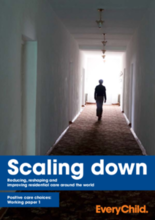This paper summarizes the evidence base on residential care to promote better decision making among policy makers and child welfare practitioners. It calls for an end to the unregulated and unplanned growth of residential care in many parts of the world, with priority given to ending residential care for children under three, and care in large scale facilities. The paper examines the role of small group homes and children's villages in the continuum of care options, arguing for a careful and limited use of such facilities only for children for whom family-based care is not appropriate or available.
The paper calls for improvements in the quality of any residential care that continues to be used, identifying key elements of high quality care. Finally, the paper outlines strategies for reducing reliance on residential care, including increasing political will, preventative work to reduce overall numbers in the care system, and strategies to promote alternatives, such as foster care.

